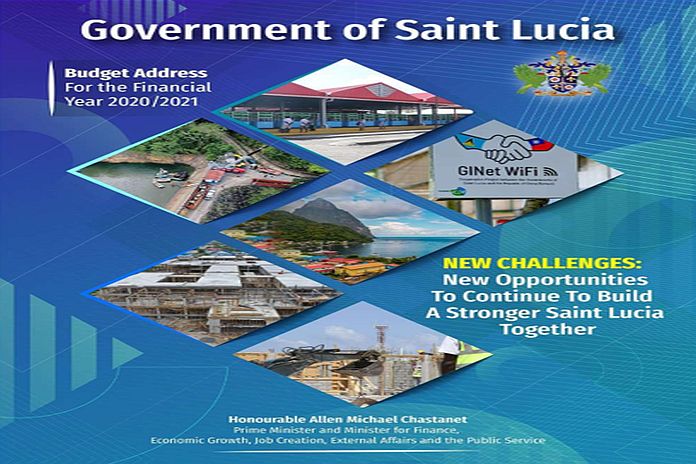TORONTO, Canada – Many businesses are laying off workers, bankruptcy looms and the ‘new normal’ will be quite different of life experiences in modern existence, start-and-stop economic cycle, COVID-19 iron grip on the economy.
Governments and some businesses have tried opening, to co-exist with coronavirus at an unsustainable capacity below 50 percent. That initial optimism soon fizzled with another shutdown showing how difficult this crisis is to navigate. Others are simply unable to open in need of remodelling to new social and economic realities.
The situation is unpredictable, with changes day by day. The absence of domestic and foreign tourists from major markets, regional trade and the free movement of people, the stagnation of capital, and the disruption of trade routes (sea, land and air) goods and services compound economic viability.
Saint Lucia’s prime minister budget address: A wonderland of vacuous relics, featured last week, drew the raw uselessness of the usual suspects, to which I revisit, more specifically: The real employment and economic management numbers in Saint Lucia.
“In my first budget address, I described our socio-economic profile as one of high unemployment and high debt, coupled with chronically-low growth which would inevitably result in widening income inequality. I affirmed my government’s commitment to transforming our country rather than accepting mediocrity and sticking to the “do nothing” mentality. We underscored the need to re-engineer and modernize our economy.
“We were also very proud of the fact that our policies and initiatives had resulted in a dramatic reduction in unemployment from over 24 percent when we took office to 16.8 percent as of last year.
“While the government must play its part in reforming the business environment, it is the engagement of the private sector that will create truly sustainable jobs that will reduce unemployment.”
It could be said that defying the most pessimistic forecasts, the above faces uncertain of policy formulation and execution of pragmatism and that the revival of Saint Lucian and most regional economies will take a multiyear recovery cycle to heal.
Economic data is not reporting employers are hiring workers faster than anticipated, compounded by recent setbacks in economic reopening and subject to increases of coronavirus cases, reiterates that despite early pragmatism, pretty slow public health and the economic outlook remains constant.
The reality supported by data for the Caribbean region is grim. Events pre and post labour day up and the down the US East-West coast, Europe, and Africa substantiate the ‘recovery’ is losing steam.
Saint Lucia, a predominant tourism-dependent country is no exception albeit, revised entry requirements, a ‘State of Emergency’ remains in effect until September 30, 2020, amid a weak, ill advised and ‘misappropriate’ government.
Coupled with the impact of commerce, global economics and tourism, domestic and regional manufacturing company SMJ Beverages Ltd, recently announced that it had decided to “shut down [its] manufacturing operations” in Saint Lucia and make its staff redundant. COVID-19 pandemic affected its performance, sales, and revenue. Exports of its products had virtually dried up and this has had a significant impact on its financial performance since exports contributed to “over 75 percent of [its] manufacturing functions.”
The closure of SMJ came on the heels of the decision by Coconut Bay Hotel to temporarily close the hotel and make its staff of approximately 400 redundant. Unobtrusively, similar is taking place weekly without much accounting of the gravity of the situation in a pre-election atmosphere.
Naturally, the prime ministers’ comprehension alludes to a budget address that reads:
“So, when the coronavirus broke out, our country was on the cusp of another comeback and had just achieved positive growth of 1.7 percent in 2019. We had recorded three consecutive years of positive growth since our return to office. Unemployment had fallen from over 24 percent to 16.8 percent over four years; our debt to GDP ratio had also fallen to below the prudential 60 percent target set by the Eastern Caribbean Central Bank to be achieved by 2030; tourism arrivals had hit a record high of approximately 1.3 million, supermarket purchases of our agricultural products were on the increase and there was renewed interest in the manufacturing sector, recording its highest growth of 6.1 percent over the last six years. These are the facts.”
Despite a previous account that the “truth is what you believe” recites:
“As the economy continued to grow, the unemployment rate continued to fall. At the end of the last quarter of 2019, the unemployment rate was 16.8 percent. Youth unemployment also decreased from an average rate of 36.3 percent in 2018 to 31.6 percent in 2019. Consumer price inflation was 0.5 percent in 2019 compared to 2.6 percent in 2018.”
Still, with customary bravado taking credit for an economic rebound that preceded the prime minister [2016] he has not taken credit for Saint Lucians not receiving unemployment benefits, business recovery assistance, pitiful National Insurance Corporation (NIC) benefits, and the socio-economic plummet that is shattering records and destroying lives.
Meantime, incredible rhetoric is publicized to proposed new development as a spectacular accomplishment amid dire economic situations is astonishing, but not unexpected of psychological underpinnings.
Strong and precise direction is required to embrace changes truly deserving right now.
More convincing of the idioms – I always put people first – represents “realistic proposals in keeping with the real state of the country, and seek to improve the quality of life of the people,” with “policies intended to touch the lives of all the people of Saint Lucia.”
But, once again, the prime ministers’ salesmanship opens a credibility gap between his 2020/2021 estimates of revenue and expenditure and the budget address, ‘a recital of unworthiness’ in a start-and-stop economic cycle.
Many economists expect the unemployment rate to increase accompanied by weak October/November reports when small businesses finances are likely to exhaust their borrowings capacity, and NIC inadequate payments will expire, resulting in a massive cash cliff and a bankruptcy cycle for the economy. These are just hard realities that require sound thought process and policy execution.
Going forward @GlobalCaribbean and affiliates anticipate a stalled economy, continued public health emergency, business and personal bankruptcy. There is ample evidence despite the rhetoric – COVID-19 has as iron grip on the social and economic viability for the distant future.
While regional governments rely on bonds and treasury yields, investors and traders anticipate wild fluctuations and anemic growth. And contrary to political leaders, crafty salesmanship, fancy charts, infrastructure renderings, psychological placating and play-acts of forgiveness are meaningless.
Out of the many capital projects proposed several will be entangled in the start-and-stop economic cycle, COVID-19 iron grip on the economy. Many will be employed and unemployed, in the revolving cycle of a complete recovery.
It remains to be seen if governments will implementing genuine new regulations and policy execution targeted at recovery, and how might genuine businesses get this information for planning purposes and executive decision making, absent the whims of where you stand with the political establishment.
Nonetheless, we continue to read and hear about dreamers, government micro-managers and bureaucrats that un-intelligently pontificate, ‘Safe Saint Lucia – the place to be in 2020,’ expecting jobs and economic growth will come roaring back.
In the natural course of business and governance, uncertainty is a job killer and wealth destabilizer to which business, investors, property owners cannot plan. Moreover, amid policymakers unpredictable, and incoherent government interventions deciding winners and losers – and which business can open and close – is akin to anarchic.
Further, speaking truth to power and deliberating on the principles of professional training has somehow become obsolete, frighten by the not so secretive clique of bureaucrats that decides social and economic survival, that facilitate a tin-pot dictatorship in Saint Lucia, on the verge of an election defeat.
Not surprisingly, under these conditions, businesses became reluctant to engage in new business plans, employment, or investment. Realistically, a “recovery” amid and/or after lockdown and political uncertainty [general election] genuine new regulations and the non-provision of financial help for economic recovery is the making of day-dreamers wishful indulgence.








